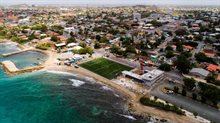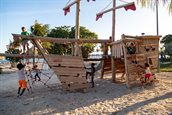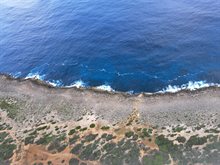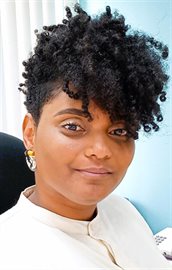Island Voices: interview with Pédzi Flores-Girigori
In the Caribbean part of the Kingdom, the effects of climate change are already being felt by people on the islands. It is getting warmer, periods of drought are increasing and when rain falls, much more falls in a shorter period of time. Moreover, hurricanes are becoming more powerful. How should the islands adapt to this? What is happening to prepare the islands and islanders for the future? In the series of interviews ‘Island Voices’, residents from different islands and with different areas of expertise talk about how they view climate change and adaptation.
In this interview, Pédzi Flores-Girigori, Head of Operational Meteorology at the Meteorological Department Curaçao, explains why she considers climate adaptation important, what motivates her and how she views the future of Curaçao.
Want to know more about climate adaptation in the Caribbean islands? On the knowledge portal you will now also find a section on the Caribbean part of our kingdom.
Since when have you been involved in climate adaptation on Curaçao?
“Within the Meteorological Department, I conducted the first research into the future of Curaçao's climate in 2011 and 2012. It was based on a hundred years of data we had on temperature and precipitation. I was concerned about the results of this research: it did not look good for Curaçao. It was clear that the island is getting drier and temperatures are rising. Over the last hundred years, it has been getting two degrees warmer on average. But I am really a problem solver and saw it as a challenge to secure Curaçao's future. In the years that followed, I held talks with people about climate change and helped set up a simple warning system to inform people about heavy showers and heat, for example. I also set up a programme at the Meteorological Department to make children more aware of what the department does and what meteorology is, which always included climate change. At some point, I started focusing on policy. I realised that as a scientist, you speak a very different language from those who make policy. But thanks to my technical background and my talent for explaining complex issues in simple language, I could very easily turn the technical story into a policy story that connects to everyday life.”

And do you use that talent to move policymakers into action?
“Yes. What really moves me is this: I have studied and I see that I can make a contribution to my island. I try to do that within my circle of influence. You cannot sit in the chair of politicians. But if you tell the story well and clearly, you do get them on board. That has enormous added value: a story that is easy to understand has a much wider reach. My motivation remains that I want to solve problems. There is also a mental challenge in it that I can enjoy myself.”
Can you tell a little more about the programme on children's awareness that you founded?
“That was a great stepping stone to put the topic of climate change on the map. Partly because of that programme, more attention came to climate change and climate adaptation within the department. To get a better overview of everything that was happening on the island on climate adaptation, we set up the Curaçao Climate Change Platform. I then worked as a policy officer on the impact of climate change and the history of water management on Curaçao, among other things. After all, Curaçao has traditionally been very dry. How did the inhabitants deal with water in the past and what can we learn from this? What should we do now that rainfall patterns are changing? I have always tried – in a smart way – to include climate change in everything I did as a story of the future. From 2018, I was also concerned with climate change at a higher level and I made policy for the integral water management on Curaçao that includes different adaptation strategies.”

What does Curaçao need now to become more climate resilient?
“I must say that we have already made a lot of progress. Our Prime Minister Gilmar Pisas has promised that Curaçao will commit to the United Nations climate treaty. That treaty has been signed by the Netherlands. But because Curaçao is an autonomous country within the Kingdom, the island can decide for itself whether it wants to adhere to the treaty. That this is now going to happen is very good. It also makes our work more visible. More attention has been paid to climate change on Curaçao. Residents are also becoming more environmentally aware. In the words of astronaut Neil Armstrong: these are small steps but together they constitute a giant forward.”
What role do you expect the Netherlands to play in this?
“Relations within the Kingdom are a very difficult discussion, with the history of slavery recurring. Slavery created a certain culture, with a certain behaviour. Practices on the islands that are seen as unsustainable are often a manifestation of prosperity for the islanders. At the same time, Western ways of thinking and acting are seen as the ideal. Climate adaptation means that islanders need to start changing their habits and behaviour. Our biggest challenge is to turn this behaviour into sustainable behaviour. This will not automatically succeed through the Western or European way of doing things. It is very important that the Dutch government understands and respects that. The European way leads to passive resistance and is sometimes impossible to apply to a small community like you have on an island. When people are forced to do things the Western way, they are no longer willing to talk openly and honestly about their problems. They dig in their heels and frustrate possible solutions. This is what the Dutch government has to watch out for. Respect the knowledge and expertise on the islands, and above all, make use of it.”
Can you give an example of a cultural difference?
“The Netherlands has a strong culture of reading and making reports. Curaçao's civil service has partly adopted that. But what you notice is that this results in a lot of plans that are then not implemented. Or that many more civil servants are needed to implement the plans than Curaçao has. You have to take those capacity and resource constraints into account. I also see that the islands are finding their own way and are trying to work more independently. The Netherlands should support that development without wanting to be on top of it all the time. Of course, sometimes mistakes can be made. But by making mistakes you also learn how to grow further in a relatively young democracy.”

What would you like to pass on to future generations?
“One problem I struggle with myself is that so many young people from Curaçao go to the Netherlands to study, but then don't return. I find that very unfortunate, because they can contribute a lot to the development of the islands. They don't even necessarily have to live on the islands to do so. You can also contribute from somewhere else. I am committed to making them realise that. That you can contribute to the climate challenge on Curaçao if you have studied somewhere else. As my ultimate goal, I envision a Curaçao that always has enough water and where we can still enjoy our bays and beaches. And where, when I am old, I can fish on a chair along the coast, and that the fish I caught in my youth will still be there.”
About Pédzi Flores-Girigori
Pédzi was born and raised in Curaçao. She holds a master's degree in physics and climate studies from Utrecht University, with a specialisation in astronomy and particle physics. She also holds a diploma as an operational meteorologist from the Royal Netherlands Air Force. She started her professional career at the age of 23 in 2008 as a junior meteorologist at the Meteorological Department of Curaçao, where she has been Head of Operational Meteorology since 2014. She is also secretary of Curaçao's Integrated Water Commission and a member of the Steering Committee of Curaçao's Climate Change Platform. Her work involves capacity building, awareness raising and policy development. Her passion lies in trying to bridge the gap between policymakers and scientists. She has expertise in water, disaster management, climate impacts and adaptation, and sustainable development goals.

Pédzi Flores-Girigori